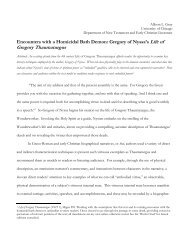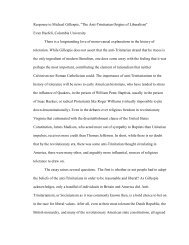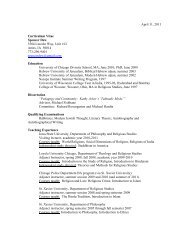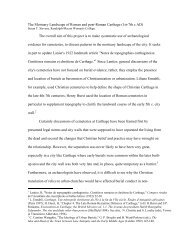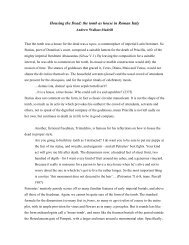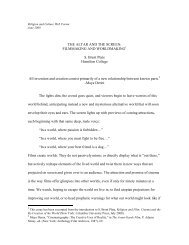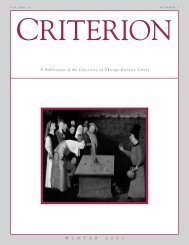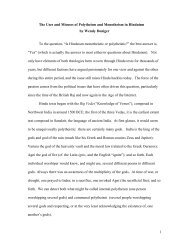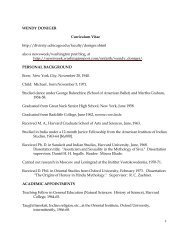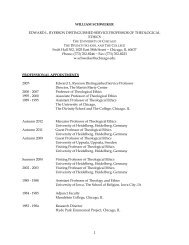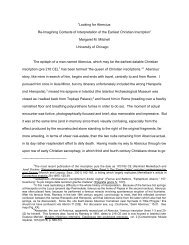The Reification of Evil and The Failure of Theodicy: The Devil in ...
The Reification of Evil and The Failure of Theodicy: The Devil in ...
The Reification of Evil and The Failure of Theodicy: The Devil in ...
You also want an ePaper? Increase the reach of your titles
YUMPU automatically turns print PDFs into web optimized ePapers that Google loves.
the Tsar (Nicholas I) found so threaten<strong>in</strong>g <strong>in</strong> the activities <strong>of</strong> this circle, but the regime was one<br />
<strong>of</strong> the more repressive ones <strong>in</strong> Russian history. If Dostoevsky had been harshly punished for<br />
seem<strong>in</strong>gly rather benign political activities, he also got away with someth<strong>in</strong>g: his activities <strong>in</strong> the<br />
far more radical Speshnev Circle rema<strong>in</strong>ed unknown until after his death.<br />
5 In fact, the paternity is never proven, though one wonders how it could have been. <strong>The</strong> claim<br />
is based on Fyodor Pavlovich’s drunken <strong>and</strong> bragg<strong>in</strong>g confession <strong>of</strong> the crime. “Bragg<strong>in</strong>g” is not<br />
le mot just, however, s<strong>in</strong>ce the rather repellant topic under discussion was whether Lizaveta<br />
could, <strong>in</strong> any sense, be considered a woman – that is, sexually desirable. <strong>The</strong> “gentlemen” with<br />
whom Fyodor Pavlovich had been dr<strong>in</strong>k<strong>in</strong>g decide that she is not, but Fyodor Pavlovich strongly<br />
differs with them. Here, he is merely act<strong>in</strong>g the buffoon <strong>in</strong> order to debase himself – his<br />
dynamic <strong>in</strong> a nutshell – but when Lizaveta is discovered to be pregnant, suspicion naturally falls<br />
on him. He seems to confirm these suspicions when Lizaveta dies dur<strong>in</strong>g childbirth, <strong>and</strong> he<br />
allows the child to be brought to his house to be cared for. Dostoevsky, however, has the<br />
narrator – who has substantial but not complete authority – carefully <strong>and</strong> cleverly debate the<br />
question <strong>of</strong> Smerdyakov’s paternity <strong>in</strong> such a way that it is not possible to decide the question<br />
with any certa<strong>in</strong>ty. For example, allow<strong>in</strong>g Smerdyakov to be raised <strong>in</strong> his house po<strong>in</strong>ts to<br />
Fyodor Pavlovich’s guilt, but the latter never treats him like a son, even an illegitimate one. But<br />
how does one <strong>in</strong>terpret such lack <strong>of</strong> paternal behavior, s<strong>in</strong>ce he had already been shown to be<br />
impossibly careless <strong>and</strong> heedless about his legitimate children, literally forgett<strong>in</strong>g about them for<br />
months or years at a time? He could easily have accepted Smerdyakov <strong>in</strong>to the household with a<br />
similar lack <strong>of</strong> attention or forethought. Dostoevsky seems to want this po<strong>in</strong>t to rema<strong>in</strong><br />
ambiguous.<br />
6 And, notably, Ivan states explicitly that he does not deny the existence <strong>of</strong> God, only that he<br />
“returns him the ticket”.<br />
7 Dostoevsky, <strong>The</strong> Brothers Karamazov (BK), Book 3, chapter 6. This citation is from the<br />
Constance Garnett translation, but all subsequent ones are from the translation by Richard Pevear<br />
<strong>and</strong> Larissa Volokhonsky, V<strong>in</strong>tage Classics, 1991, <strong>in</strong> which the statement appears as an epithet<br />
from Fyodor Pavlovich, “…your lackey soul” (p. 125). In say<strong>in</strong>g that Smerdyakov has the soul<br />
<strong>of</strong> a lackey, I do not th<strong>in</strong>k that Dostoevsky <strong>in</strong>tended to say that Smerdyakov was “only” a<br />
peasant or <strong>of</strong> the lower classes: he was a lackey <strong>in</strong> his lack <strong>of</strong> spiritual aliveness <strong>and</strong> hence,<br />
freedom.<br />
8 I use this term <strong>in</strong> the sense <strong>in</strong> which it used by Max Scheler, not Nietzsche. See Ressentiment,<br />
edited by Lewis A. Coser, translated by William W. Holdheim, 1972, Schocken Press, N.Y.<br />
9 <strong>The</strong> defense attorney, Ippolit Kirillovich, is famous for his eloquence <strong>and</strong> use <strong>of</strong> modern<br />
“psychology”. He is also <strong>in</strong>competent, <strong>and</strong> carries out an <strong>in</strong>competent defense. Dostoevsky has<br />
been called “anti-psychological” – an odd term for an author so widely adored for his brilliant<br />
<strong>and</strong> penetrat<strong>in</strong>g psychological character studies. But the term “anti-psychological” needs to be<br />
understood properly. Dostoevsky was anti-psychological only <strong>in</strong> the sense that he relentlessly<br />
punctured simplistic <strong>and</strong> rationalistic – that is, “scientific” – psychology, <strong>of</strong> the type used by<br />
Kirillovich. His most anti-psychological character was the Underground Man, whose essence is



